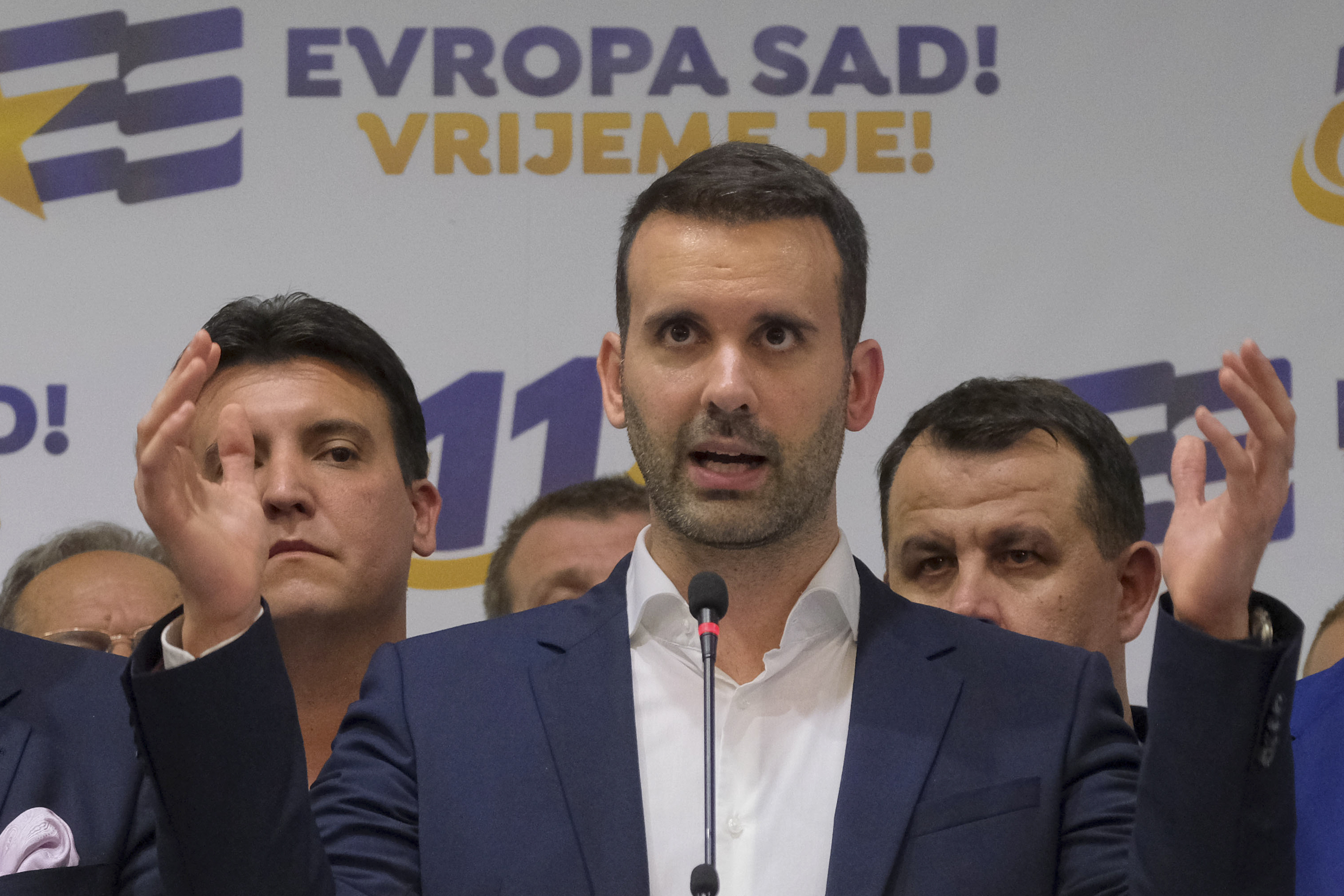Montenegro
Can the pro-Europeans form a government?

Milojko Spajic, president of the centrist Europe Now party speaks at his headquarters after parliamentary election in Montenegro's capital Podgorica, Sunday, June 11, 2023.
© picture alliance / ASSOCIATED PRESS | Risto BozovicA good two months after the presidential elections that brought the thirty-year era of long-term ruler Milo Djukanović to an end, some 540,000 Montenegrins were once again called to vote for their parliament on Sunday. Most of the votes were cast by the “Europe Now!” (“Evropa Sad!”) movement, which was founded only a year ago. To form a new government, however, the party needs at least two more partners.
The parliamentary election had been called as recently as March by then President Djukanović in order to end the political crisis in the Adriatic republic caused by the breakup of Prime Minister Dritan Abazović's government. After two rounds of voting for the presidential election, the low turnout of only 56.4 percent – twenty percent less than in the 2020 elections – was indicative of citizen fatigue after years of political disappointment.
The “Europe Now!” movement received 25.6 percent of the vote (23 seats), while the ticket of Djukanović’s long-ruling DPS party still won 23.8 percent (21 seats). The pro-Serbian electoral alliance “For the Future of Montenegro” (“Za budućnost Crne Gore”) came third with 14.8 % (13 seats), ahead of the green-conservative alliance around Prime Minister Abazović, who was ousted by a motion of censure, with 12.3 % (11 seats). Thus, there is no clear winner of the election. However, the formation of a government could also prove difficult due to personal animosities among the leaders of the pro-European parties.
Stability and resilience of new executive by no means assured
Unlike the parliamentary elections in 2020, the pre-election period was not dominated by identity issues within the small Balkan state, but by economic and social policy issues. Following the triumph of its candidate Jakov Milatović in the presidential elections in March/April, the “Europe Now!” movement was also predicted to win the legislative elections. To do so, the young movement apparently lacked “ground troops” – traditional core voters who reliably deliver percentage points with disciplined voting behavior especially in a low turnout.
Polls show that the messages of “Europe Now!” were not considered credible either. Among other things, the party promoted a 35-hour workweek and the abolition of health insurance contributions, which many voters dismissed as unrealistic campaign promises. Public skirmishes between the newly elected president Jakov Milatović and the party leader – and probable prime minister – Milojko Spajić also cost the movement votes.
The Democratic Party of Socialists (DPS) held up surprisingly well after the resignation of its long-term leader Milo Djukanović. Although it fell from 35 to 21 seats in Parliament, as the largest opposition party it remains an alternative should a new government fail. The future of the DPS depends on whether it can credibly rid itself of allegations of corruption.
In purely mathematical terms, either the pro-Serbian alliance “For the Future of Montenegro” or the conservative-green coalition “Be Brave!” of still incumbent Prime Minister Abazović must be part of a future government. However, the party leader of “Europe Now!” Milojko Spajić raised serious accusations of corruption against Abazović and ruled out cooperation on election night. Since “Europe Now!” also ruled out cooperation with the DPS in the run-up to the election, the room for manoeuvre is narrowing.
Are the pro-Europeans getting their act together?
The coalition “For the Future of Montenegro” was able to assert itself as the leading force among the pro-Serbian parties with 13 mandates. The pro-Serbian parties, which recently heralded the end of the Djukanović era with Dritan Abazović’s election as prime minister, paid dearly for splitting up into several electoral lists. It seems paradoxical that this has increased the chances of government participation, since the electoral alliance of ethnic Serbs, which has shrunk by several parties, will now be content with a more modest role in government. On election night, their top candidate Milan Knežević underscored the importance of Montenegro’s European path, which can certainly be understood as an offer to “Europe Now!”.
“Tomorrow is a new day,” chairman of “Europe Now!” Milojko Spajic said after the election. “We will not be arrogant and we will sit down with everyone who shares our values. We will, of course, form a new pro-European government.”
In the case of a coalition between “Europe Now!” and the pro-Serbian alliance, the support of other minority parties, first and foremost that of the Bosniaks, would be necessary, which would be good for the diversity of the new government. Whether Serbs and Bosniaks in Montenegro will be able to reach agreement in coalition negotiations is anyone’s guess. Ultimately, this could make the identity issues that often paralyze the political process less relevant, which would be immense progress in a country like Montenegro, which is torn by ethnic disputes.
It would be a strong signal if such disparate actors could agree on one common goal: significant progress in reforming Montenegro’s economy and rule of law to make the former constituent republic of Yugoslavia fit for EU accession. Hopefully, the political parties will take advantage of the new balance of power created by the ouster of “Eternal President” Djukanović and his DPS, and recognize that the changed geopolitical situation in Europe puts the country’s EU accession within the realm of possibility.
Dušan Dinić is Senior Manager at the Belgrade office of the Friedrich Naumann Foundation for Freedom.
